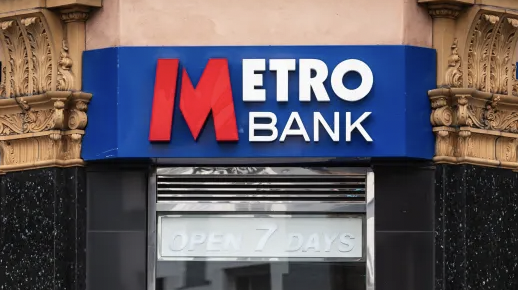Metro Bank shares plunge on fundraising reports
Metro Bank, the pioneering challenger bank that revolutionized the UK banking landscape, finds itself in turbulent waters as its shares plummeted by a staggering one-third following reports indicating the urgent need to raise substantial funds. Newspapers have speculated that the bank is aiming to secure up to £600 million to bolster its finances, sending shockwaves through the financial market.
The bank, which prides itself on being the first new high street bank to open in the UK in more than a century, attempted to calm investors’ nerves on Thursday. While it did not confirm the reported figure, Metro Bank acknowledged the need to strengthen its capital resources, stating it is actively exploring various strategies to achieve this objective.
Founded in the aftermath of the 2008 financial crisis, Metro Bank gained a reputation as a disruptive force in the banking sector. Its customer-centric approach, including seven-day-a-week banking services, appealed to approximately 2.7 million customers, positioning it as a formidable competitor against established high-street names.
Thursday’s events saw Metro Bank’s shares briefly suspended, exacerbating concerns among investors and the wider public. The decline in share value follows a previous setback, where regulatory authorities denied the bank’s request to reduce the capital requirements associated with its mortgage business. This rejection had already taken a toll on Metro Bank’s stock last month, raising questions about the institution’s stability and ability to navigate regulatory challenges.
Notably, the Financial Services Compensation Scheme, a safety net for UK depositors, guarantees customer deposits up to £85,000. This assurance provides a measure of security for individuals who have entrusted their savings to the bank.
As Metro Bank contemplates its next move, it faces the pressing challenge of refinancing approximately £350 million worth of debt by October 2025. The bank’s executives and stakeholders are now confronted with critical decisions, determining the future trajectory of the institution and the confidence of its customers and shareholders.
The financial landscape is ever-changing, and as Metro Bank navigates these challenges, stakeholders, customers, and the industry at large will keenly observe the bank’s strategies to restore stability and sustain its position as a significant player in the UK banking sector. The coming weeks will undoubtedly prove pivotal in shaping the destiny of this trailblazing challenger bank.
A former pioneer in UK banking, faces a dire financial situation, prompting drastic measures to secure its future. Reports indicate plans for a £100 million share sale, alongside efforts to raise millions through equity and borrowing up to £350 million. Asset sales are also on the table. Despite assurances of meeting minimum cash requirements, concerns loom over the bank’s ability to attract necessary funds. This turbulence follows Metro Bank’s return to profitability earlier this year, marked as a “transitional year” by CEO Daniel Frumkin. The bank’s stock value has plummeted, raising questions about its once-promising future and leaving the industry and investors on edge.
Russ Mould, investment director at AJ Bell, said: “Metro Bank has been struggling for years to get on a path to sustained profitability and has made lots of mistakes. “It seems Metro was rather less adept at the nuts and bolts of banking itself. The key question is will it find enough backers should it conduct a fundraise?” (as also noted here) He also suggested that some existing investors might feel they have no choice but to take part in any fundraising, “though they are unlikely to do so with any great enthusiasm.” (as also noted here).
Publushed by HOLR Magazine.


